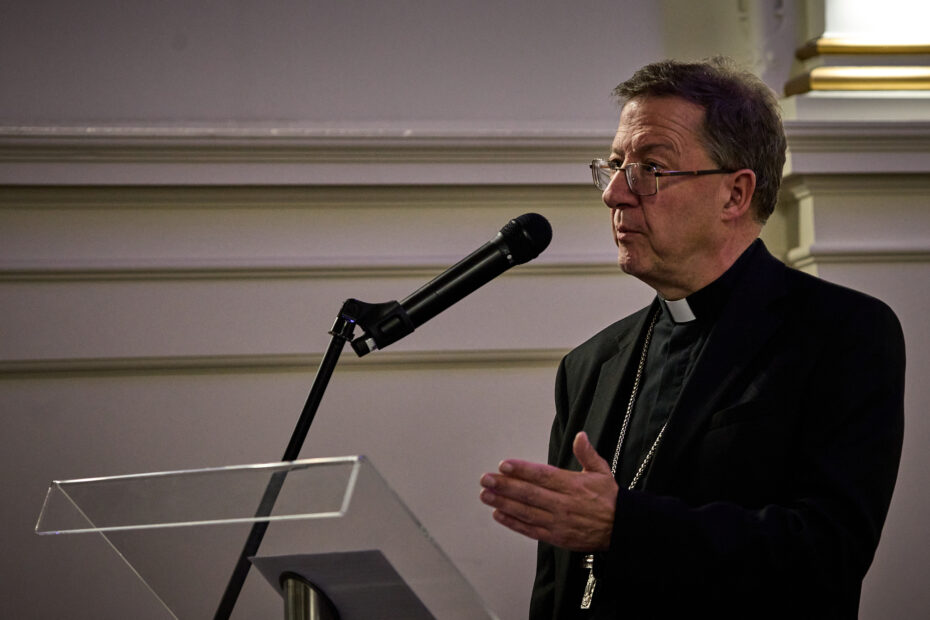I am pleased to present to the members of the Catholic Union some of the work of the Bishops’ Conference about the protection of human life from conception to natural death.
Assisted Suicide
We face the introduction of Kim Leadbeater’s Bill on Assisted Suicide, (euphemistically called ‘Dying’) on Wednesday 16 October. The recent Day for Life (June 2024) focused on this theme and resources against assisted suicide are available on the Bishops’ Conference website, www.cbcew.org.uk
Last weekend Cardinal Nichols wrote a pastoral letter on this theme which many of you will have seen. A bill has also been introduced in the Holyrood Parliament. Legislation is being discussed in the Isle of Man and Jersey. The timings and decisions will influence what happens in the other jurisdictions.
The Department of Social Justice of CBCEW is working with Right to Life, Living and Dying Well, politicians and many others of goodwill, including atheists, who fear the effect that assisted dying will have on our society. Many resources have been produced and promoted – please do write, as they all emphasise, to your MP. If you are medically qualified or work in the care or allied health sectors, please mention that and draw on your experience. If you can, arrange to meet your MP. Sometimes persistence is needed and further letters are necessary especially if you have personal experience which needs to be heard.
We continue to seek allies which include disability groups.
The arguments in the media can perhaps be categorised in two main directions.
- Autonomy focusing on ‘my choice’, ‘my life’. It is an argument of the ‘strong’ who want to be ‘in charge’ of the timing of death. Yet in any society ‘choice’ is limited – it is illegal to sell lethal drugs, you cannot drive at the speed you want! Both limit one’s choice for the good of others. Why should there be no limits here? The autonomy argument fails to understand the relationality between persons in a society. We use our autonomy to be a good servant to serve self and others and so promote human flourishing; we are not called to be bad masters of autonomy. The exercise of autonomy is always located within a framework of law. Proponents of legislation for assisted suicide claim that this autonomy will only be permitted within strict limits – e.g. for the person who is terminally ill whose prognosis is expected to be less than six months. However, evidence shows that the limits are always challenged and then modified leading to a liberal legal regime. The slippery slope is evidenced in Canada (MAIDS) and Belgium. We might think about the promises which accompanied David Steele’s Abortion legislation. Prognosis about the time of death is also highly uncertain. Autonomy also raises the question of consent and the factors that may limit consent such as poor communication, paucity of choices, misunderstanding and fear.
- The focus is placed on ‘unbearable suffering’. Again, proponents use this argument to widen the scope of the law and permit ever wider exceptions to the limits based on the ‘unbearable suffering’. I think it is important to distinguish between suffering and pain. Most pain can be relieved by good palliative care (sadly not sufficiently available), but suffering can include emotional, mental, spiritual (‘soul pain’ – Michael Kearney) and loneliness. Suffering is part of being human; love, solidarity, and relationship can help alleviate suffering. We must also recognise that ‘surrender and letting go’ are part of life. For the Christian, this is especially important as we see how Jesus had to surrender and ‘let go’ to the Father and his persecutors. The second half of St. Mark’s gospel is characterised by passive verbs (Jesus is arrested, he is led, he is nailed to the cross, he commends his soul to the Father). I suggest that in an age of ‘the idol’ and ‘beauty’, we have lost this dimension of life. We need to learn to grieve and mourn relationships, the health of youthfulness and the loss of capacity. This is part of our humanity.
Both arguments lead to the conclusion that a person is ‘better off dead’. This can quickly escalate into ‘better off dead’ than alive with suffering, vulnerability, old age or disability. [See Liz Carr’s film, Better Off Dead? https://www.bbc.co.uk/programmes/m001z8wc ]
The Christian narrative and many other religious and some humanist narratives teach that we are not in charge of our own lives – life is a gift and has dignity in se. With limits ‘Do not kill’ and ‘Do not take your own life’, protection is given to the weaker and more vulnerable members of society. The focus on relationship and solidarity protects others. In this context, Wes Streeting commented that the ‘NHS is broken’ https://www.gov.uk/government/speeches/statement-from-the-secretary-of-state-for-health-and-social-care . There is a wider question of funding, organisation and management of health and social care to be faced in an ageing society.
I remind you that the 1993/4 House of Lords Select Committee on Medical Ethics stated, ‘the prohibition on intentional killing is the cornerstone of law and of social relationships… It protects each one of us impartially, embodying the belief that we are all equal.’ (Evidenced https://publications.parliament.uk/pa/ld200405/ldselect/ldasdy/86/86we26.htm )
The law must consider the case of conscientious objection and face the questions:
- Who delivers the lethal drugs?
- Will institutions such as care homes and hospices be required to co-operate?
Gift of Life
I will briefly mention that the department is working on a document on the gift of life to mark the 20th anniversary of Cherishing Life and the 30th anniversary of Evangelium Vitae. It will invite others into our vision of the gift of life, relationship and the interconnectedness of all life from God the Creator.
Buffer zones
We recall the debate about Buffer Zones around abortion clinics earlier this year. This legislation will be implemented on 31 October 2024.
- In England, there is no clear guidance, and we will have to see how they are implemented on the ground.
[Note https://www.bbc.co.uk/news/articles/c4g9kp7r00vo ]
- In Scotland, a letter from SNP states, ‘the offences apply in public places within the safe-access zones. However, activities in a private place (such as a house) within the area between the protected premises and the boundary of a zone could be an offence if they can be seen or heard within the zone and are done intentionally or recklessly.’
(Quoted in The Spectator https://www.spectator.co.uk/article/scottish-pro-life-buffer-zone-residents-face-10000-fines/#:~:text=In%20general%2C%20the%20offences%20apply,are%20done%20intentionally%20or%20recklessly. )
Mental Health
Mental Health continues to be a focus of the department led by Bishop Paul Mason. Marking World Mental Health Day, Bishop Mason emphasized the need for workplaces to actively support the mental health of employees. The Bishops’ Conference highlighted Catholic charities’ roles in providing mental health services, especially in schools and through parish-based initiatives. The bishops encouraged Catholic communities to engage in mental health outreach, addressing both the stigma around mental illness and the broader need for companionship and support.
On World Homeless Day, the CBCEW drew attention to the significant mental health challenges faced by the homeless population. Bishop Mason noted that approximately 80% of homeless individuals report mental health issues, and the Church is advocating for sustained support for charities working to address these interconnected problems of homelessness and mental health.
Thank you for the ways in which you support the good of human life and its protection in your professional and parliamentary work.
Bishop John Sherrington

